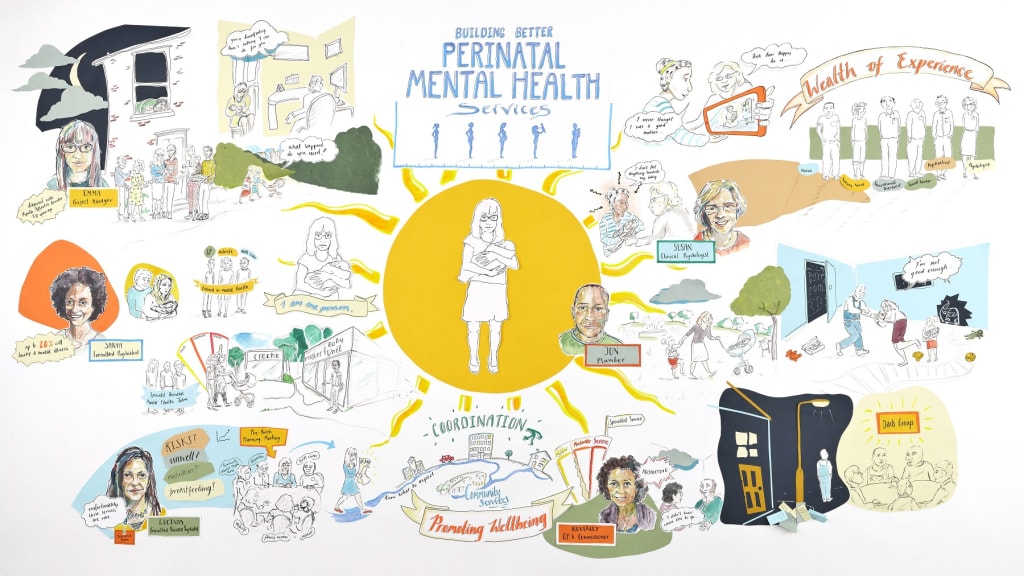
Choosing to start a family is portrayed to be a joyous and wonderful time—indeed, the idea is sold by the mainstream media as the pinnacle of every woman’s lifelong dream to become a mother.
This is a problematic notion for many as it excludes those who wish not to have children and simultaneously disregards those who may not be able to fall pregnant or carry to term. Rarely do we consider, however, the sense of trepidation that having a child can cause for women who experience mental health difficulties and how significant the impact can be on the woman, her child, and society as a whole.
Now, in no way is this piece intended to suggest that having a mental health condition means that pregnancy and motherhood are inevitably going to be a difficult event. However, more awareness is needed about the importance of ensuring that the mental health of the family unit is taken into account and remains well-supported during this challenging transition.
That’s right—the mental health of both women and their partner, or any other people involved in the process of raising a child, is significantly important.
Take, for example, a woman who discovers she is pregnant after being sexually abused; a teenager who is due to give birth right before her finals; the wife in a domestically violent relationship; a mother who has faced countless miscarriages or survived a potentially life-threatening complication in her last pregnancy. This is not even an exhaustive list of the types of people who may approach the idea of having a child with anxiety, fear, and hesitation. However, these cases illustrate the need for a cultural sensitivity in how we approach the topic of pregnancy, highlighting how the experience is not the same for every woman. Complicate this further with being a mother who faces the prevailing stigma of being labeled as having a mental health condition, and it is easy to see how the current system is failing so many people.
Now, we are all aware of the one in four statistic, but did you know that the Royal College of General Practitioners estimates that as many as 50 percent of people diagnosed with postpartum psychosis have no previous psychiatric history? Postpartum psychosis, accounting for two out of every 1,000 pregnancies, is characterized by episodes of mania or severe depression and features delusions or hallucinations which can result in suicide or, in tragically extreme circumstances, infanticide.
Suddenly, it becomes glaringly apparent that these preventable deaths need to be taken seriously and proper protocols need to be in place to ensure that mental health is highlighted on the agenda to keep women and their children safe at all stages of the perinatal journey.
In order to understand when mental health issues are beginning to develop, it is necessary to have a contextual reference of the “normal” range of emotional changes and fluctuations, from which any deviance can be detected and promptly addressed. These changes can be emotional, physical as well as psychological, and can predispose an expectant mother to a range of complications and forms of ill health that can endanger their lives. Defined as perinatal mental illness, or PMI, this encompasses the aforementioned postpartum psychosis but also includes mild, moderate or severe depression; chronic, serious mental illness such as schizophrenia, schizoaffective disorder, and bipolar disorder; adjustment disorders and even anxiety. These can affect a woman’s ability to bond with her baby and is linked with behavioral and emotional challenges which span early childhood through to adolescence. Links between anxiety disorders and preterm births, as well as between depression and early developmental or cognitive problems, have been well established in the literature.
The Centre for Mental Health and the London School of Economics estimates an annual cost of £8.1 billion, which is directly attributable to the cost of caring both for a mother experiencing mental health difficulties and the resulting impact this can have on her child, including learning and behavioral challenges.
So, what can we—as health professionals, but also as people who know and care for expectant mothers—do to improve the lives of women who show signs of mental distress?
Talk. By talking, we continue to advocate and raise awareness of mental health in pregnancy and bring it to the forefront of national consciousness. Asking how a pregnant woman is feeling, whether she is managing to cope with the different stages of her transition into motherhood and reassuring her that she is not alone can make a world of difference. The signs can be subtle—feeling hopeless about breastfeeding, for example—or more obvious: refusing to leave the house for fear that the baby will succumb to great harm. But, by opening up these discussions, we are best placed to notice when things don’t seem right and get the appropriate levels of help and support.
Talk, also—where it is appropriate to do so—to the father, to the family. Have they become aware that anything has changed recently? Do they need any extra support? Are they even aware of where to turn if they need help? Every question creates an opportunity which could potentially save a life.
If you or a loved one has been affected by any of the issues touched upon in this article and need further support, please consider the following services or speak with a medical professional at the earliest opportunity:
Association for Post Natal Illness
Action on Postpartum Psychosis
Best Beginning: Out of the Blue





Comments
There are no comments for this story
Be the first to respond and start the conversation.